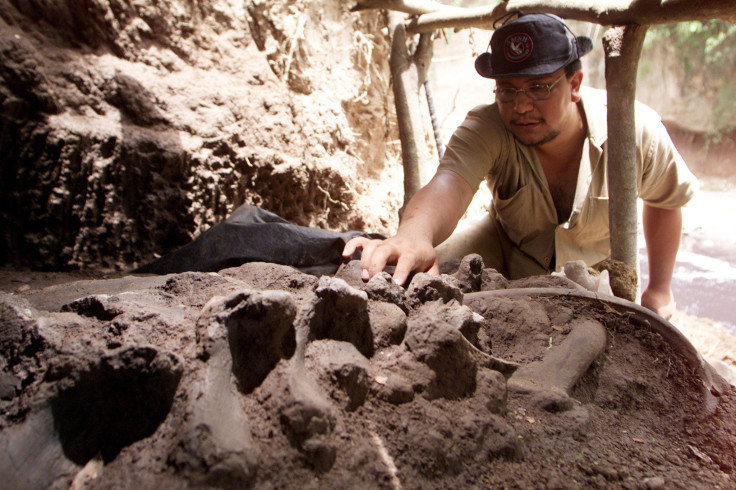Ice Age Puppies Discovered: Scientists Probe Mummified Remains Of Ancient Dogs To Learn About Man's Best Friend [PHOTOS]

Scientists are probing the remains of two Ice Age puppies found perfectly preserved in Russia's far northeast region of Yakutia and dating back 12,460 years that could offer clues about the origin of domesticated dogs.
"To find a carnivorous mammal intact with skin, fur and internal organs — this has never happened before in history," said Sergei Fyodorov, head of exhibitions at the Mammoth Museum of the North-Eastern Federal University in the regional capital of Yakutsk, Agence France-Presse reported Monday.
The mummified dogs were found by hunters searching for mammoth tusks in a riverbank by a deposit of ancient bones in remote Arctic tundra, about 4,700 kilometers (2,900 miles) from Moscow. As they explored the area, they found a puppy's snout in the permafrost.
The hunters informed Fyodorov of their discovery and he later found the second puppy a few feet away. The dogs both died when they were about three months old and were likely siblings, said Fyodorov. It's unclear if the Ice Age dogs were domesticated or wild.
"The condition of our new find is perfect," Fedorov told The Siberian Times. "It is preserved from nose to tail, including the hair. You can see the hair on the paw on the picture."
The discovery includes the second puppy's remarkably well-preserved brain, "the first in the world," he said. "Puppies are very rare, because they have thin bones and delicate skulls," he added.
The dogs were discovered five years ago, and a team of scientists from across the world are now probing the remains to learn more about the animals' diet and environment. Scientists will reconstruct the Ice Age puppies' genomes over the next year. The preserved brain will also be compared with that of modern dogs and wolves and parasites found on its body will be analyzed.
"Thus far, the lineages of wolves that likely gave rise to dogs have not yet been discovered and it's possible that these puppies could be on that lineage, which would be very exciting," evolutionary biologist Greger Larson of University of Oxford in the U.K., who is working on the project, told AFP.
Bark to the future: Ice Age puppies may reveal canine evolution #science https://t.co/OI542TcyHr pic.twitter.com/eFcxhO8gbJ
— World Science News (@RealtimeScience) March 28, 2016
Russia's remote Arctic region is known for its prehistoric discoveries, including finds such as a small wolverine and two lion cubs. "All of them were found on the territory of Yakutia," Fyodorov said. "There are no other discoveries of well-preserved Pleistocene predators worldwide."
Ice Age puppies found by hunters #science https://t.co/jkXiTNxHmW pic.twitter.com/xzWeSW87Kh
— Brandon Livesay (@brando_lives) March 28, 2016
The world's oldest dog remains were discovered in a cave in Belgium. They were 36,500 years old but weren't as well preserved as this latest find. Many scientists have argued that dogs were first domesticated in Europe and the Middle East, while other research has pointed to Southeast Asia.
Mietje Germonpre, of the paleontology department of the Royal Belgian Institute of Natural Sciences, called the Russian puppy discovery "unique" and "the oldest mummified dog in the world."
"It's amazing. In other museums around the world you will only find the remains of adult dogs, but this is a puppy," she told the Mirror last year. "All external signs and scan results indicate that it is a primitive dog, and at the moment it is the most ancient one found in northern Siberia."
© Copyright IBTimes 2024. All rights reserved.






















